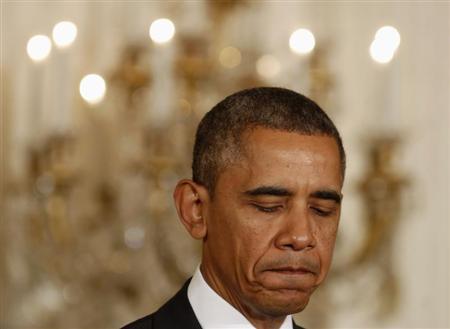(Reuters) – To his critics, President Barack Obama often has seemed to be conveniently distant when trouble has hit his administration.

But on Tuesday, Obama was hit with a public-relations crisis that struck at the core of his domestic and foreign policy – one that raised questions about whether he had misled Americans on his signature healthcare overhaul, and whether he really was unaware of the U.S. government’s alleged spying on its allies.
It was a dramatic twist for the Democratic president, who was widely seen as outflanking Republicans during the budget battles that led to a partial government shutdown and a near-default by the U.S. government this month.
Until this week, most of the discussion in Washington on the “Obamacare” health insurance program focused on its clumsy rollout, as symbolized by a balky website that is frustrating uninsured Americans’ efforts to enroll in the program.
But several media reports on Tuesday raised questions about whether the administration was completely truthful in selling the program to Americans four years ago, after Obama was first elected president.
The latest flap dates to a pledge that Obama made in 2009 about the healthcare initiative that remains the biggest achievement of his nearly five years in office.
“If you like your healthcare plan, you’ll be able to keep your healthcare plan, period,” he told the American Medical Association in Chicago on June 15, 2009, a mantra he has repeated regularly – including during his 2012 re-election, when Republicans were saying that the law would force millions of Americans to lose their insurance.
“No one will take it away, no matter what,” Obama has said.
But as potentially millions of Americans are learning now, the pledge came with some caveats.
Those who buy their own insurance on the open market and who have policies that don’t meet minimum standards of the Affordable Care Act are likely to have their policies canceled and replaced with higher-cost alternatives, industry analysts said on Tuesday.
The scenario could affect a relatively small percentage of Americans, but nevertheless could involve hundreds of thousands of people who have had inexpensive policies with few benefits, analysts said.
White House spokesman Jay Carney said that the administration has always said that some healthcare plans would not meet the new requirements, which require that coverage include emergency services, maternity care, prescription drugs and other popular features.
Carney argued that these Americans would end up with better insurance coverage because they have been in a “Wild West” part of the insurance market that was under-regulated.
Republican critics pounced on the White House’s defense, saying that Obama had misrepresented the healthcare law for years. They also chided the administration for saying Obama had been surprised by the depth of the glitches on HealthCare.gov, the federal government’s online insurance exchange.
“In the old days people used to call (Republican President) Ronald Reagan the ‘Teflon president’ if something bad happened in his administration and it did not stick to him,” Republican strategist Charlie Black said.
“But that title much more fits President Obama, who goes out of his way to not take responsibility for anything bad that happens.”
‘THAT’S A BIG PROBLEM’
Black’s shot at Obama was part of a chorus of “I-told-you-so” criticism launched by Republicans who have made reversing Obamacare their top priority, claiming that it will kill jobs and raise medical costs.
It also reflected another accusation made by Republicans in recent months: that Obama doesn’t seem to be in the loop on key issues involving his own administration.
On Capitol Hill on Tuesday, Director of National Intelligence James Clapper and National Security Agency Keith Alexander faced questions from lawmakers about reports that the NSA had spied on leaders of U.S. allies, including German Chancellor Angela Merkel, a key friend of the United States.
The hearing came a day after California Senator Dianne Feinstein, a Democrat who chairs the Senate Intelligence Committee, said in a statement that Obama apparently had not known that Merkel’s communications had been collected since 2002.
“That’s a big problem,” Feinstein said.
White House spokesman Carney has declined to comment on specific reports of NSA spying.
But analysts said that Obama’s apparent distance from the NSA controversy follows a pattern with his administration that they have seen in other sensitive matters, including the fatal attacks on a U.S. diplomatic post in Benghazi, Libya, last year and the flap over whether the Internal Revenue Service targeted conservative groups for additional scrutiny.
“The president has some issues here that are really a sad pattern for his second term,” said David Yepsen, director of the Paul Simon Public Policy Center at the University of Southern Illinois. “The economy is very fragile. The American people are in an anxious mood. And this sort of drum beat of troubles that the administration seems to have is just really unsettling.”
Even TV comedian Jon Stewart of Comedy Central’s “The Daily Show,” who typically saves his sharpest jabs for Republicans, is making light of what he suggests is the president’s curious disengagement from anything controversial.
“If the president is unaware that we were spying on our allies, who gave the go-ahead to spy on our allies?” Stewart said this week during a segment called, “Wait, wait … Don’t tell him.”
DEFENDING OBAMACARE
Obama’s difficulties likely have contributed to a decline in his public approval rating, now down to 40 percent in the latest Reuters/Ipsos tracking polls. Only 19 percent of those surveyed this week said the country is on the right track.
Ipsos pollster Julia Clark said the approval rating is about the lowest Obama has had, and is likely the result of political fallout from the 16-day government shutdown and the problems with the healthcare program’s launch.
“While all politicians were affected by the former, Obama personally suffers more from the latter due to the fact that it is, quite literally, branded with his name, ‘Obamacare,'” she said.
Obama’s defenders believe the controversies will blow over and that the president should focus on the next round of budget negotiations with Congress as key deadlines for action approach in December and January.
The fight over spending is likely to set the stage for the November 2014 midterm congressional elections, the outcome of which will determine whether Obama will have enough fellow Democrats in Congress to get much done in his final two years in office.
“I think the big things for the president right now are how he handles what happens in January and February and how the Republicans handle it,” said Democratic consultant Bob Shrum.
(Additional reporting by Roberta Rampton and Mark Felsenthal; Editing by David Lindsey and Paul Simao)





